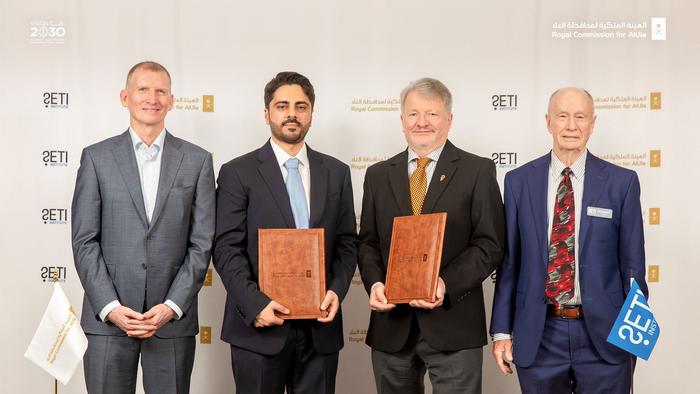Royal Commission for AlUla Collaborates with SETI Institute to Support Development of AlUla Manara Observatory

Credit: SETI Institute
Royal Commission for AlUla Collaborates with SETI Institute to Support Development of AlUla Manara Observatory
- Experts from SETI Institute will support the advancement of telescope technology and data analysis at AlUla Manara Observatory.
- The collaboration will enhance the future observatory’s capabilities as it welcomes global scientists, researchers, and tourists interested in astronomy and space science.
- Ambitions to foster curiosity, knowledge sharing, and upskilling local capabilities in astronomical and space sciences field
Mountain View, CA , 8 August 2024 — The Royal Commission for AlUla (RCU) and SETI Institute announced their collaboration agreement as part of a long-term vision to further the development of AlUla Manara Observatory as a leading destination of the future, for space research, discovery and astro-tourism.
AlUla is an ancient desert oasis located in North West Saudi Arabia with more than 200,000 years of recorded human history and ancient heritage sites with 7000 years of successive civilizations. The AlUla Manara Observatory is part of an ambitious plan to develop AlUla into a premier destination with a focus on sustainability, community and cultural and knowledge enrichment.
As part of the agreement, the SETI Institute will facilitate installation of a Laser SETI instrument at AlUla Manara Observatory. LaserSETI, an optical SETI project, monitors the sky for laser flashes that could indicate the presence of extra-terrestrial technology. The LaserSETI station would be part of a broader network scanning the entire northern hemisphere night sky from various locations.
Naif Almalik, AlUla Manara’s Executive Programme Director, said, “This collaboration enhances AlUla’s evolving role as a dynamic hub for science and knowledge exchange. It will equip AlUla Manara with the instruments needed to observe the cosmos in extraordinary detail and establish AlUla as a premier destination for research and astro-tourism. Just an hour’s drive from AlUla’s center, the observatory will inspire local youth to pursue diverse careers in advanced STEM fields, supporting the growth and economic diversification of Saudi Arabia in line with the Kingdom’s Vision 2030 ambitions. “
Additionally, the SETI Institute will support in developing data analysis systems for some of the telescopes housed at AlUla Manara Observatory and provide expertise in hardware and instrument development. The SETI Institute’s Center for Education plans to support training teachers and students using virtual reality tools to enhance local astronomy and space science capabilities. The outreach center will also create communication resources to engage visitors at AlUla Manara Observatory in astronomy, astrobiology, and SETI, aligning with RCU’s vision for AlUla to become a regional hub for research, innovation, and education.
Bill Diamond, SETI Institute CEO, said, “Embedded in the SETI Institute’s mission statement is the importance of sharing our research with the world. We are excited about this collaboration with RCU where we see the opportunity to bring the fascination of space science and education to a part of the world where there is far too little joint engagement in research, education and technology development. Curiosity unites us all as humans, and science is a powerful way to bring people closer together from different geographies and cultural backgrounds.”
The collaboration will also facilitate a diverse range of joint research projects, contribute to the growing astro-tourism initiatives already recognized and popular in AlUla, it also provides educational and upskilling opportunities for students from AlUla and across the Kingdom. The AlUla Manara Observatory is slated for a phased opening to the public in the coming years, with collaborations, research, public events, and education initiatives underway.
Franck Marchis, Senior astronomer and director of citizen science for Unistellar at the SETI Institute, said: “We envision the AlUla Manara Observatory as a beacon of discovery, equipped with advanced and cutting-edge telescopes to unveil new celestial bodies and propel astronomical research to new heights. Our Citizen Science initiative will invite the community and tourists alike to stargaze and explore AlUla’s rich scientific heritage, fostering international collaborations and reviving humanity’s profound connection to the cosmos.”
The SETI Institute’s mission is to lead humanity’s quest to understand the origins and prevalence of life and intelligence in the universe and to share that knowledge with the world. In addition to its own astronomical observatory, the Allen Telescope Array, SETI Institute researchers utilize an unparalleled network of advanced ground and space-based instruments. The SETI institute also leverages data from space-based observatories such as the James Webb Space Telescope, as well as instruments in orbit around or on Mars, including the Perseverance and Curiosity rovers.
About the Royal Commission for AlUla
The Royal Commission for AlUla (RCU) was established by royal decree in July 2017 to preserve and develop AlUla, a region of outstanding natural and cultural significance in north-west Saudi Arabia. RCU’s long-term plan outlines a responsible, sustainable, and sensitive approach to urban and economic development that preserves the area’s natural and historic heritage while establishing AlUla as a desirable location to live, work, and visit. This encompasses a broad range of initiatives across archaeology, tourism, culture, education, and the arts, reflecting a commitment to meeting the economic diversification, local community empowerment, and heritage preservation priorities of the Kingdom of Saudi Arabia’s Vision 2030 programme
About the SETI Institute
Founded in 1984, the SETI Institute is a non-profit, multi-disciplinary research and education organization whose mission is to lead humanity’s quest to understand the origins and prevalence of life and intelligence in the Universe and to share that knowledge with the world. Our research encompasses the physical and biological sciences and leverages expertise in data analytics, machine learning and advanced signal detection technologies. The SETI Institute is a distinguished research partner for industry, academia and government agencies, including NASA and NSF.
For media enquiries:
Royal Commission for AlUla publicrelations@rcu.gov.sa
SETI Institute, Director of Communications, Rebecca McDonald rmcdonald@seti.org



